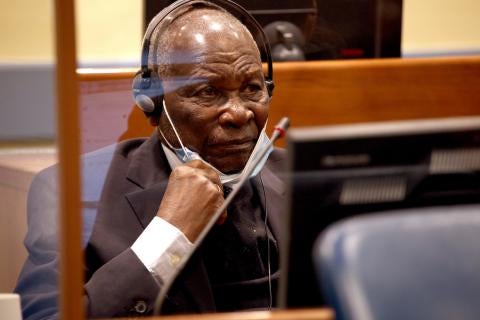
BY SAM ALFAN.
Rwanda genocide suspect Félicien Kabuga has suffered a blow after the High Court declined to unfreeze his assets in Kenya.
High Court Anti-Corruption Division Judge Esther Maina declined to set aside orders which had been obtained by the Attorney General, preserving the property belonging to Kabuga and his late wife Josephine Mukazitoni.
The order was granted in 2015 preserving the property known as Spanish Villa in Kilimani, pending the conclusion of a case pending at the International Criminal Tribunal for Rwanda against Kabuga.
Kenya Trust Company Limited, which collected rent on behalf of the Kabugas’ was directed to deposit with the High Court Registrar, all rental income and proceeds it receives from the villas less the fee it receives for managing the property.
The property generates income of between sh 80,000 to 162,000 according to receipts provided to court.
Justice Esther Maina yesterday ruled that she did not see any reason to set aside the said ruling by Justice Muga Apondi.
“I agree with Apondi ruling entirely, I see no reason to set aside that ruling. I have adopted the ruling and orders of Apondi as orders of this court and dismiss the application to set aside that ruling,” Maina ruled.
The Attorney General’s filed an application over Kabuga’s property following resolutions of the UN Security Council requiring member states to trace and freeze Kabuga’s assets.
“The respondent (Kabuga) is using his assets to avoid capture…Several UN Security Council Resolutions call for cooperation of states with ICTR in the search and arrest of fugitives as well as the tracing and freezing of their arrest,” the state had argued.
Kabuga’s late wife then filed an application to have orders issued by Justice Muga set aside.
Mukazitoni, who died in 2017, claimed that the AG had no authority to sue on behalf of the International Criminal Tribunal for Rwanda (ICTR).
She said she will suffer financial distress if orders restraining her from receiving the rent remain in force as the application was based on allegations that have not been substantiated.
She also claimed that the high court did not have jurisdiction to hear the suit saying a domestic court cannot usurp the role of an international court.
The objections were however dismissed by the court of appeal which directed the matter to proceed at the high court.
The Director of Public Prosecution in the application before the Anti-corruption court claimed that joint investigations carried out in December 2007 by Kenya Police/ICTR Officers revealed that Kabuga and his wife jointly owned the villa which is located at Kilimani Estate along Lenana road.
DPP filed a letter indicating that Kabuga who is currently on trial at a UN tribunal in The Hague was served with the application which seeks to seize the said property.
The letter by Kenya Embassy at The Hague indicated that two Embassy officials from Kenya were granted access to Kabuga on January 27 at 1100hrs but he declined to acknowledge receipt of the said documents by either signature or thumb print.
“The first respondent was able to engage the embassy officials in Kiswahili. The purpose of the visit was explained to him, as well as the contents of the court documents. However, after multiple attempts, the first respondent declined to acknowledge receipt of the documents by either signature or thumb print. The visit concluded after about 40 minutes,” stated the letter.
The letter indicates that the representatives of the International Residual Mechanism for Criminal Tribunals (IRMCT) and the UN Detention Unit suggested thereafter that the service of documents be conveyed through registered mail, addressed to the detainee in compliance with both Dutch laws and the respective mechanisms rules.






